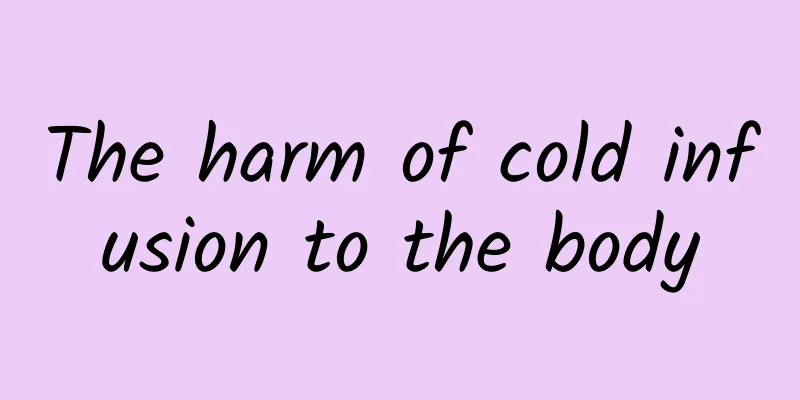The harm of cold infusion to the body

|
Everyone has had a cold. When you have a cold, you should pay attention to rest, eat a better diet, and it can also be treated with certain medications. Currently, many Chinese people have this misunderstanding. When they have a cold, they like to have an infusion. Although the infusion is more effective in treating colds and is faster than medication, it is also more harmful. It is not only easy to cause some drug resistance problems, but also has a greater impact on health. Therefore, it is best not to have an infusion for a common cold in general. The harm of cold infusion to the body Harm: Infusing a large amount of fluid in a short period of time increases the blood circulation flow, increases the burden on the heart, and also increases blood pressure. This may not be a big problem for young people, but for the elderly with heart and lung diseases and high blood pressure, especially when the drip rate is too fast, it may cause heart failure and cerebral hemorrhage. Hazard 2: In most cases, cold infusions are given in the emergency observation room or temporary ward. In order to facilitate observation of the condition of the patient, most of these places are "large rooms" shared by many patients. In order to receive intravenous infusions, patients spend more than ten hours a day in the "big room" or stay there for several days. This inevitably increases the chances of secondary bacterial infections and even "acquired pneumonia", which only makes the condition worse. Hazard 3: Even if antibiotics are really needed, the effect of intravenous drip of antibiotic solution is actually not very good. The concentration of the drug is not balanced throughout the 24 hours of the day. In this way, the antibacterial effect is even worse than oral administration or injection, which is what we often call injections. Harm four: intravenous infusion can damage our blood vessels, and giving intravenous infusion when you have a cold may even cause antibiotic resistance. So, under what circumstances can intravenous infusion be given? Experts say that the four common indications for intravenous infusion are: severe dehydration and inability to replenish fluids orally; severe infection; severe illness that makes it impossible to take oral medications; and the required medications can only be given through intravenous drips. Therefore, when we catch a cold, if the condition is not serious, we can drink more hot water to regulate our body; if the condition is more serious, it is recommended to take medicine first and put the infusion last. Why does intravenous infusion make people feel that the disease is cured quickly?In this regard, experts said: It is undeniable that the method of intravenous infusion reduces the damage of drugs due to gastric acid, and the effect is more direct, especially for patients with gastrointestinal symptoms and high fever. In addition, most of the ingredients injected into the vein are normal saline, which can replenish a large amount of water through infusion. Therefore, people will feel "comfortable" after each infusion. However, for ordinary people, it is not advisable to ask for infusion at every turn. On the other hand, infusion is the direct administration of drugs into blood vessels, so the sterility requirements are very high. If the operation is improper, the bacteria will directly enter the blood and may cause sepsis, which will be fatal. In addition, intravenous infusion has very high requirements for drug purity. If there are impurities in the drugs, the consequences are unimaginable. Therefore, from the perspective of safe use of medications, the principle that must be adhered to in treating colds is "don't take medicine if you can, don't get injections if you can take medicine, and especially don't easily inject antibiotics and hormones." |
<<: Where can I massage my child's nasal congestion due to a cold?
>>: Does rarely catching a cold mean good health?
Recommend
What is a parotid gland tumor? How are parotid gland tumors treated?
Common diseases of the parotid gland include tumo...
What causes dysmenorrhea to vomiting?
Normal dysmenorrhea will only cause mild diarrhea...
Evening primrose oil capsules
Evening primrose, also known as evening primrose,...
Why do girls sweat so much?
Sweating is a normal phenomenon. If you never swe...
What to do if you have a sore throat after running?
The sore throat after running may be caused by th...
Comminuted fracture healing time, grasp the three stages of healing
Comminuted fractures are common orthopedic diseas...
How to get rid of those annoying wrinkles on our lips
For women, it is unacceptable to have wrinkles an...
What Chinese medicine should I take for endocrine disorders?
Many women nowadays suffer from endocrine disorde...
How to treat weak spleen and stomach? Old Chinese medicine recommends methods to strengthen the spleen and stomach
In modern life, many people suffer from symptoms ...
What should I do if I have chest tightness after lung surgery?
The lungs are important organs for our breathing....
Retention Enema Retention Time
Retention enema means using a soft tube instead o...
How to deal with heart valve murmurs?
Heart disease is a common disease problem in mode...
The efficacy of tea seed husk
The tea seed shell can have the effect of beauty ...
The harm of blocked belt meridian
The eight extraordinary meridians of the human bo...
Why do I have big eye bags when I wake up early?
Eye bags are located under the eyes. They look lo...









